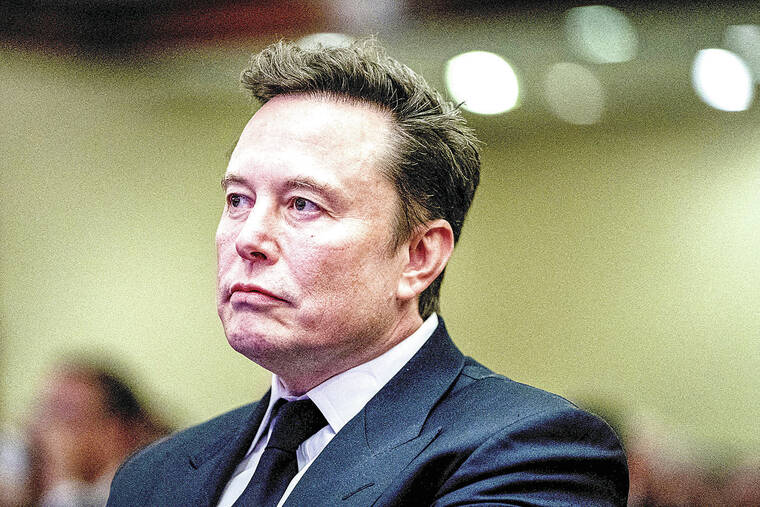Elon Musk’s $50 billion Tesla pay can’t be reinstated, Delaware judge rules
A Delaware judge Monday affirmed an earlier ruling that rescinded a giant pay package that Tesla had awarded its CEO, Elon Musk.
The pay, in the form of stock options, was worth more than $50 billion and helped make Musk the richest person in the world. The package is now worth $100 billion after Tesla’s share price jumped sharply in recent weeks.
ADVERTISING
The judge, Chancellor Kathaleen St. J. McCormick of the Delaware Court of Chancery, struck down the award in January, ruling that shareholders had not been properly informed of its details and that members of Tesla’s board were not sufficiently independent.
But lawyers for Tesla and Musk argued that a second shareholder vote in June in favor of the package cleared the way for effectively reinstating it.
The pay comes from a 2018 award that said Musk would get all the options only if Tesla’s stock price soared and its sales and earnings grew strongly. Few expected Musk to achieve all of those targets because Tesla was still struggling to sell enough electric cars to become profitable. But Tesla’s business took off, and its stock rocketed higher, allowing Musk to earn all the options in the following years. He has to hold them for five years.
The shareholder who brought the suit, Richard J. Tornetta, contended that Tesla’s board had not acted independently of Musk when devising the package and that the company had provided “materially misleading” information to investors. In her January ruling, after a trial in 2022, McCormick said, “The process leading to the approval of Musk’s compensation plan was deeply flawed.”
To try to get the judge to change her mind, Tesla’s lawyers argued that shareholders were sufficiently informed when they overwhelmingly voted again for the package in June. But in her ruling Monday, McCormick wrote that the Tesla lawyers’ arguments had several flaws. Among them was that they could not hope to flip a decision “based on evidence they created after trial.”
She also said a “stockholder vote standing alone cannot ratify a conflicted-controller transaction,” referring to a situation in which a major shareholder has influence over a board and its decisions.
In any case, McCormick said, the June vote was flawed because the board presented “materially misleading” information to shareholders in the proxy statement urging them to ratify Musk’s pay package again.
Among the “many ways in which the proxy statement mangles the truth,” she wrote, was the assurance that a new vote would change the outcome of the case.
Tesla said on X, the social media site that Musk owns, that it would appeal the decision.
“A Delaware judge just overruled a supermajority of shareholders who own Tesla and who voted twice to pay @elonmusk what he’s worth,” the company said on its corporate account. “This ruling, if not overturned, means that judges and plaintiffs’ lawyers run Delaware.”
Also on X, Musk reposted comments from supporters including Cathie Wood, CEO of Ark Invest, a firm that owns Tesla shares. “No judge has the right to determine CEO compensation,” Wood said.
Tesla’s board of directors will most likely try to fashion a new pay package that falls under the jurisdiction of Texas, where the company has since moved its corporate registration from Delaware, said Charles Elson, founding director of the Weinberg Center for Corporate Governance at the University of Delaware.
But any new compensation award will be vulnerable to legal challenges if the board does not demonstrate more independence from Musk, Elson said. “They can always create a new package,” he said. “But they have to be very careful in the way they construct it.”
Elson praised the decision, saying a ruling in Musk’s favor “would have really changed for the worse Delaware conflict-of-interest law.”
McCormick also ordered Tesla to pay $345 million in fees to lawyers who represented shareholders in the case. That was far less than the $5.6 billion that the lawyers had sought.
Still, lawyers for shareholders said they were pleased with the ruling. “We hope that the chancellor’s well-reasoned decision will end this matter for the shareholders of Tesla,” lawyers for the firm Bernstein Litowitz Berger & Grossmann said in a statement. They added that they were looking forward to defending the judgment if Tesla appealed it to the Delaware Supreme Court.
Tesla’s shares have risen more than 40% since the presidential election, as many investors believe that President-elect Donald Trump will pursue policies that could benefit the company and Musk, who spent roughly $200 million to support Trump’s candidacy.
Some investors are betting that Tesla will build enormous numbers of autonomous vehicles that will also act as taxis. And they hope that the next Trump administration will introduce federal rules that could help Musk achieve those plans.
Without the 2018 award, Musk still has a nearly 13% stake in Tesla worth nearly $150 billion. In her January ruling, McCormick said those shares “gave him every incentive to push Tesla to levels of transformative growth.”
This article originally appeared in The New York Times.
© 2024 The New York Times Company


